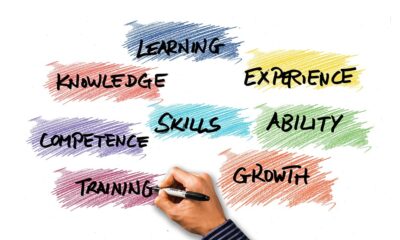Psychology of Things
How does the psychology of investors impact market cycles?

In this article, we will explore how the psychology of investors impacts market cycles. We will delve into the emotional aspects that drive investors to make decisions, and how these decisions can ultimately affect the market as a whole. By understanding the psychological factors at play, we can gain insight into the patterns and fluctuations that characterize market cycles.
What role does fear play in market cycles?
Fear is a powerful emotion that can drive investors to make hasty decisions in times of uncertainty. During periods of market downturns, fear can lead to panic selling, causing prices to plummet even further. This fear-driven selling can create a domino effect, as more investors become apprehensive about the market, leading to a vicious cycle of selling and declining prices.
Conversely, fear can also prevent investors from taking advantage of buying opportunities during market downturns. The fear of losing money can paralyze investors, causing them to miss out on potential bargains. Understanding how fear influences investor behavior is crucial in navigating market cycles.
How does greed impact market cycles?
Greed is another powerful emotion that can drive investors to take excessive risks in pursuit of high returns. During times of market euphoria, investors may become overconfident in their investments, leading to inflated asset prices. This can create a bubble that eventually bursts, resulting in a market correction.
Greed can also lead to herd behavior, where investors follow the crowd without conducting their own due diligence. This herd mentality can amplify market fluctuations, as investors collectively buy or sell assets based on emotion rather than rational analysis. Recognizing the role of greed in market cycles can help investors make more informed decisions.
How does optimism influence market cycles?
Optimism is a positive emotion that can drive investors to take risks and seize opportunities. During times of economic growth, optimism can fuel bullish sentiments in the market, leading to increased investment activity and rising prices. This optimism can create a self-fulfilling prophecy, as investors’ positive outlooks drive further market gains.
However, excessive optimism can also lead to complacency, as investors may overlook potential risks and dangers in their pursuit of profits. When optimism turns into irrational exuberance, it can set the stage for a market correction. Understanding the impact of optimism on market cycles can help investors balance risk and reward.
How does uncertainty affect market cycles?
Uncertainty is a constant factor in the financial markets, as investors grapple with unknown variables and risks. During times of uncertainty, market cycles can become more volatile, as investors struggle to predict future trends and outcomes. This uncertainty can lead to erratic price movements and abrupt shifts in investor sentiment.
Uncertainty can also create opportunities for savvy investors to capitalize on market inefficiencies and mispricings. By embracing uncertainty and conducting thorough analysis, investors can navigate market cycles with greater confidence and resilience. Recognizing the role of uncertainty in shaping market cycles is essential for successful investing.
How does regret influence market cycles?
Regret is an emotional response to past decisions that can influence future behavior in the financial markets. When investors experience losses or missed opportunities, they may succumb to feelings of regret, leading to emotional decision-making. This regret-driven behavior can exacerbate market cycles, as investors seek to recoup their losses or make up for past mistakes.
Regret can also lead to inertia, where investors become paralyzed by past failures and are unable to take decisive action. Overcoming regret and learning from past experiences is crucial in navigating market cycles effectively. By recognizing the role of regret in influencing investor behavior, individuals can make more rational and objective investment decisions.
Conclusion
The psychology of investors plays a significant role in shaping market cycles. Emotions such as fear, greed, optimism, uncertainty, and regret can drive investor behavior, leading to fluctuations in asset prices and market trends. By understanding how these psychological factors influence decision-making, investors can better navigate market cycles and make informed investment choices. By staying mindful of their emotions and biases, investors can achieve greater success in managing their portfolios and achieving long-term financial goals.
FAQs
1. How can I manage my emotions during market cycles?
Managing emotions during market cycles involves staying disciplined, diversifying your portfolio, and focusing on long-term goals. By practicing mindfulness and self-awareness, investors can avoid making impulsive decisions based on emotions.
2. How do I know when to buy or sell during market cycles?
Timing the market is challenging, and it is often more prudent to focus on fundamental analysis and valuation metrics. By conducting thorough research and seeking advice from financial professionals, investors can make more informed decisions.
3. How can I protect my investments during market downturns?
To protect investments during market downturns, investors can consider hedging strategies, such as diversification, defensive stocks, or options trading. By mitigating risk and preserving capital, investors can weather market cycles more effectively.
4. What are the benefits of a long-term investment strategy?
A long-term investment strategy can provide stability, lower transaction costs, and reduce the impact of short-term market fluctuations. By focusing on a buy-and-hold approach, investors can benefit from compounding returns and ride out market cycles.
5. How can I overcome analysis paralysis and make confident investment decisions?
To overcome analysis paralysis, investors can set clear investment goals, establish a decision-making framework, and seek input from trusted advisors. By breaking down complex decisions into manageable steps, investors can make more confident and decisive choices.
Psychology of Things
How does psychology influence economic decision-making?

In this article, we will explore how psychology plays a crucial role in shaping economic decision-making. Understanding human behavior, cognitive biases, and emotions can provide valuable insights into why people make the choices they do in the realm of economics.
What is behavioral economics?
Behavioral economics combines insights from psychology and economics to study how individuals make decisions in various scenarios. Traditional economics assumes that people are rational and always act in their best interest. However, behavioral economics recognizes that humans are prone to biases and irrationality, which can influence their economic decisions.
For example, the concept of loss aversion suggests that individuals are more sensitive to losses than gains. This tendency can lead to risk-averse behavior in financial decision-making. By understanding these psychological factors, economists and policymakers can design interventions to nudge people towards making better choices.
How do cognitive biases impact economic decision-making?
Cognitive biases are systematic patterns of deviation from rationality in judgment. These biases can affect how individuals perceive information, evaluate risks, and make decisions. One common cognitive bias is confirmation bias, where people tend to seek out information that confirms their existing beliefs while ignoring contradictory evidence.
In the context of economics, cognitive biases can lead to suboptimal decision-making. For instance, anchoring bias occurs when individuals rely too heavily on an initial piece of information (the anchor) when making subsequent judgments. This bias can influence pricing, negotiations, and investment decisions.
What role do emotions play in economic decision-making?
Emotions play a significant role in shaping economic decisions. Fear, greed, and overconfidence can cloud judgement and lead to impulsive choices. Investor behavior during financial crises, such as panic selling or hoarding assets, is often driven by emotional responses rather than rational analysis.
Moreover, social factors can amplify emotions and influence decision-making. The herd mentality, where individuals follow the actions of the crowd without critical evaluation, can lead to market bubbles and crashes. Understanding the psychological underpinnings of emotions can help economists anticipate and mitigate the impact of irrational behavior in economic systems.
Can psychological interventions improve economic decision-making?
Psychological interventions, such as nudges and cognitive-behavioral techniques, can help individuals make better economic decisions. Nudges are subtle cues or prompts that steer people towards desired outcomes without restricting their choices. For example, setting defaults for retirement savings or displaying energy consumption feedback can encourage positive economic behavior.
Cognitive-behavioral therapy (CBT) can also be applied to financial decision-making by addressing psychological barriers and promoting healthier money habits. By combining insights from psychology with economic incentives, policymakers and financial institutions can design interventions that empower individuals to make more informed and rational choices.
Conclusion
Psychology plays a crucial role in influencing economic decision-making. By understanding behavioral economics, cognitive biases, emotions, and psychological interventions, economists can gain valuable insights into why individuals make certain choices in the economic realm. By integrating psychological principles into policy-making and financial services, we can create a more informed and sustainable economic environment.
FAQs
1. Can economics and psychology be integrated to improve decision-making?
Yes, behavioral economics combines insights from psychology and economics to understand how individuals make decisions in various scenarios. By recognizing cognitive biases, emotions, and social influences, we can design interventions to nudge people towards better choices.
2. How do cognitive biases impact economic decision-making?
Cognitive biases can lead to suboptimal decision-making by influencing how individuals perceive information, evaluate risks, and make choices. These biases, such as confirmation bias and anchoring bias, can affect pricing, negotiations, and investment decisions.
3. What role do emotions play in economic decision-making?
Emotions can cloud judgment and lead to impulsive decisions in economics. Fear, greed, and overconfidence can drive behavior during financial crises, while social factors like the herd mentality can amplify irrational responses in markets.
4. How can psychological interventions improve economic decision-making?
Nudges and cognitive-behavioral techniques can help individuals make better economic choices by providing subtle prompts and addressing psychological barriers. By combining insights from psychology with economic incentives, policymakers can design interventions that empower rational decision-making.
5. What are some examples of psychological interventions in economics?
Examples of psychological interventions include setting defaults for retirement savings, displaying energy consumption feedback, and using cognitive-behavioral therapy to promote healthier money habits. These interventions aim to improve decision-making and financial well-being.
Psychology of Things
– What factors influence a woman’s arousal and desire?

In this article, we will explore the various factors that can influence a woman’s arousal and desire. Understanding these factors can help individuals navigate their own experiences and relationships with a better understanding of the complexities of human sexuality.
What role does physical attraction play in a woman’s arousal?
Physical attraction is a key factor in a woman’s arousal and desire. Research shows that women are often drawn to individuals who exhibit traits associated with health and fertility, such as facial symmetry and a strong jawline. Additionally, factors such as body language, grooming, and overall appearance can also impact a woman’s level of attraction to a potential partner.
It’s important to note that physical attraction is subjective and can vary from person to person. Some women may be more drawn to certain physical characteristics, while others may prioritize emotional connection and personality traits.
How does emotional intimacy influence a woman’s desire?
Emotional intimacy plays a crucial role in a woman’s desire and arousal. Building a strong emotional connection with a partner can create a sense of trust, security, and comfort that can enhance a woman’s willingness to engage in sexual activity. Communication, empathy, and mutual respect are key components of emotional intimacy that can deepen a woman’s desire for her partner.
Studies have shown that women often report feeling more sexually satisfied when they feel emotionally close to their partner. This bond can help to increase feelings of arousal and desire, leading to a more fulfilling sexual experience for both partners.
What impact does stress have on a woman’s arousal?
Stress can have a significant impact on a woman’s arousal and desire. High levels of stress can trigger the release of cortisol, a hormone that can interfere with the body’s natural arousal response. This can lead to a decrease in sexual desire and an increase in feelings of anxiety and tension.
It’s important for individuals to prioritize self-care and stress management techniques in order to reduce the negative effects of stress on sexual desire. Engaging in activities such as exercise, mindfulness, and relaxation can help to lower stress levels and improve overall wellbeing, which can in turn positively impact a woman’s arousal and desire.
How do cultural beliefs and societal expectations influence a woman’s sexuality?
Cultural beliefs and societal expectations can have a powerful influence on a woman’s sexuality. Messages from media, family, and religious institutions can shape a woman’s attitudes towards sex, relationships, and her own body. Society often places pressure on women to conform to certain standards of beauty and behavior, which can impact their feelings of arousal and desire.
It’s important for individuals to challenge these societal norms and cultivate a positive and accepting attitude towards their own sexuality. By embracing diversity and celebrating differences, women can feel empowered to explore their desires and express their sexuality in a way that feels authentic and fulfilling to them.
How can past experiences impact a woman’s current level of arousal?
Past experiences, both positive and negative, can have a lasting impact on a woman’s current level of arousal and desire. Traumatic experiences, such as sexual assault or abuse, can create feelings of fear, shame, and disconnection that can hinder a woman’s ability to feel arousal and engage in sexual activity.
Conversely, positive experiences, such as a loving and supportive relationship, can enhance a woman’s sense of trust, safety, and pleasure, leading to increased levels of arousal and desire. It’s important for individuals to seek therapy and support in order to heal from past trauma and cultivate a healthy and fulfilling relationship with their own sexuality.
Conclusion:
Overall, a woman’s arousal and desire are influenced by a complex interplay of factors, including physical attraction, emotional intimacy, stress, cultural beliefs, societal expectations, and past experiences. By understanding and addressing these factors, individuals can cultivate a healthy and fulfilling sexual relationship with themselves and their partners.
FAQs:
1. Can medication affect a woman’s arousal?
Yes, certain medications, such as antidepressants and hormonal contraceptives, can impact a woman’s arousal and desire. It’s important to consult with a healthcare provider if you have concerns about the effects of medication on your sexual health.
2. How can communication improve a woman’s sexual satisfaction?
Open and honest communication with a partner can enhance a woman’s sexual satisfaction by creating a safe and supportive environment for sharing desires, boundaries, and preferences. It’s important to prioritize communication in order to build a strong and fulfilling sexual relationship.
3. What role does self-care play in enhancing a woman’s arousal?
Self-care practices, such as exercise, mindfulness, and relaxation, can improve a woman’s overall wellbeing and positively impact her level of arousal and desire. Taking care of your physical and mental health is essential for cultivating a healthy and fulfilling sexual relationship with yourself and your partner.
4. How can therapy help women address past trauma and improve their sexual wellness?
Therapy can provide a safe and supportive space for women to process and heal from past trauma, such as sexual assault or abuse. A trained therapist can offer guidance and techniques to help women overcome feelings of fear, shame, and disconnection, and cultivate a healthy and fulfilling relationship with their sexuality.
5. What can individuals do to challenge societal norms and embrace their sexuality?
Individuals can challenge societal norms by educating themselves, seeking out diverse perspectives, and engaging in open conversations about sexuality and gender. By celebrating differences and embracing diversity, women can feel empowered to explore their desires and express their sexuality in a way that feels authentic and fulfilling to them.
Psychology of Things
Exploring the Relationship Between Psychology and Fashion: How Do Our Clothing Choices Reflect Our Inner Minds?

In this article, we will delve into the fascinating relationship between psychology and fashion, and how our clothing choices can reveal insights into our inner minds. Have you ever wondered why we are drawn to certain styles, colors, or brands when it comes to our wardrobe? Let’s explore the deeper meaning behind our fashion choices and what they say about our personalities and emotions.
How does our upbringing influence our fashion choices?
Our upbringing plays a significant role in shaping our fashion preferences. The way we were raised, the values instilled in us by our parents, and our cultural background all have an impact on the clothes we choose to wear. For example, someone who grew up in a conservative household may prefer more modest and classic styles, while someone raised in a more liberal environment may be more experimental with their fashion choices.
Moreover, our childhood experiences and memories can also influence our clothing choices. Certain colors, patterns, or fabrics may evoke positive emotions from our past, leading us to gravitate towards them in our wardrobe. Our upbringing forms the foundation of our fashion identity, reflecting who we are and where we come from.
How do our emotions affect the way we dress?
Our emotions play a significant role in determining how we dress on a daily basis. When we feel happy, confident, or in control, we are more likely to choose bright colors, bold patterns, and statement pieces that reflect our positive mood. On the other hand, when we are feeling sad, anxious, or insecure, we may opt for darker colors, loose-fitting clothing, or comfort clothes that provide a sense of security.
Furthermore, our emotions can also influence our shopping habits. Retail therapy is a common phenomenon where people seek comfort and distraction by purchasing new clothes. During times of stress or sadness, we may be more inclined to indulge in retail therapy as a way to lift our spirits and boost our self-esteem. Our emotions not only impact how we dress but also how we shop for clothes.
Can fashion be used as a form of self-expression?
Fashion is a powerful form of self-expression that allows us to communicate our personality, values, and beliefs to the world. The clothes we choose to wear serve as a visual representation of who we are and what we stand for. Whether we prefer minimalist and understated styles or bold and avant-garde looks, our fashion choices speak volumes about our inner selves.
Moreover, fashion can be a tool for empowerment and confidence-building. When we wear clothes that make us feel good about ourselves, we exude a sense of self-assurance and authenticity. By expressing ourselves through fashion, we can assert our individuality and uniqueness in a world that often tries to box us into stereotypes and norms.
How does social media influence our fashion choices?
Social media has revolutionized the way we consume and engage with fashion. Platforms like Instagram, Pinterest, and TikTok have become virtual runways where trends are set, and styles are showcased. Influencers and celebrities play a significant role in shaping our fashion choices, as we look to them for inspiration and guidance on what to wear.
Moreover, social media algorithms and targeted ads have personalized our shopping experiences, showing us products and brands that align with our interests and preferences. The constant exposure to curated content and aspirational images on social media can influence our perception of beauty, style, and fashion, leading us to emulate the looks we see online in our own wardrobes.
Conclusion
In conclusion, the relationship between psychology and fashion is a complex and multifaceted one. Our clothing choices can reveal a lot about our inner minds, including our upbringing, emotions, self-expression, and social influences. By understanding the psychological factors that drive our fashion decisions, we can gain deeper insights into ourselves and our identities. Fashion is not just about looking good; it’s about feeling good and expressing who we truly are.
FAQs
1. How can I use fashion to improve my mood?
Fashion can be a powerful tool for boosting your mood and self-esteem. Choose clothes that make you feel confident, comfortable, and authentic. Experiment with different styles, colors, and silhouettes to find what resonates with you personally. Remember that fashion is a form of self-expression, so have fun with it and don’t be afraid to step out of your comfort zone.
2. Can my fashion choices impact how others perceive me?
Absolutely! The way you dress can influence how others perceive and interact with you. Whether you want to make a bold statement or blend in with the crowd, your fashion choices can signal your personality, values, and aspirations. Be mindful of the message you want to convey through your clothes and choose outfits that reflect your authentic self.
3. How can I stay true to my personal style in a world of fast fashion and trends?
Staying true to your personal style in a world of fast fashion and trends can be challenging, but it’s not impossible. Focus on building a versatile and timeless wardrobe filled with pieces that truly speak to your aesthetic and preferences. Invest in quality staples that can be mixed and matched to create a signature look that is uniquely yours.
4. Is it important to follow fashion trends to be stylish?
While following fashion trends can be fun and inspiring, it’s not a requirement to be stylish. True style is about expressing your individuality and creativity through your clothing choices, regardless of what’s currently in vogue. Find what works for you and makes you feel good, rather than blindly following trends that may not align with your personal taste.
5. How can I use fashion as a form of self-care?
Using fashion as a form of self-care involves cultivating a positive and empowering relationship with your wardrobe. Treat yourself to pieces that make you feel happy, confident, and comfortable. Practice mindfulness when getting dressed, focusing on how your outfit makes you feel on a deep emotional level. Remember that self-care is about honoring and nurturing yourself, and fashion can be a beautiful tool for self-expression and self-love.

 Psychology of Things12 months ago
Psychology of Things12 months ago– How does the psychology of advertising influence consumer behavior?

 Psychology of Things11 months ago
Psychology of Things11 months agoHow does psychology influence economic decision-making?

 Psychology of Founders12 months ago
Psychology of Founders12 months agoWho Are the Founding Fathers of Psychology?

 Psychology of Founders12 months ago
Psychology of Founders12 months agoWho is the Father of Forensic Psychology? Exploring the Pioneers in the Field

 Psychology of Studies12 months ago
Psychology of Studies12 months agoWhat recent breakthroughs have online psychology studies made in understanding human behavior?

 Psychology of Things11 months ago
Psychology of Things11 months agoHow does the psychology of fear impact our decision making?

 Psychology of Things12 months ago
Psychology of Things12 months agoHow does our psychology influence our relationship with money?

 Psychology of Founders12 months ago
Psychology of Founders12 months agoWhat contributions did Wilhelm Wundt make to psychology to earn the title of founder?
































